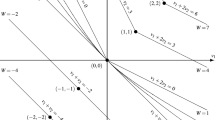Abstract
Wilson's generalization of Arrow's impossibility theorem has been proved for the realm of private goods and economic preferences by Border and by Bordes and Le Breton. However, their proofs require the exclusion of the zero vector from the commodity space. This paper assumes continuity of social preference to obtain the impossibility theorem for the entire allocation space, even if the society is infinite. A simple corollary reveals that there is some individual who is assigned the zero consumption vector at every social optimum whenever the social welfare function is nonnull and nonimposed, and satisfies Arrow's independence axiom and continuity and transitivity of social preference.
Similar content being viewed by others
References
Arrow KJ (1951) Social choice and individual values. Wiley, New York
Bergstrom TC, Parks RP, Rader T (1976) Preferences which have open graphs. J Math Econ 3: 313–316
Blau JH (1957) The existence of social welfare functions. Econometrica 25:302–313
Border KC (1983) Social welfare functions for economic environments with and without the Pareto principle. J Econ Theory 29:205–215
Border KC (1985) Fixed point theorems with applications to economics and game theory. Cambridge University Press, New York
Bordes G, Le Breton M (1988) Arrovian theorems with private alternative domains and selfish individuals. J Econ Theory (forthcoming)
Campbell DE (1988) Can equity be purchased at the expense of efficiency? An axiomatic inquiry. University of Toronto (mimeo)
Campbell DE (1989) Arrow's theorem for economic environments and effective social preferences. Soc Choice Welfare 6: 325–329 (this issue)
Donaldson D, Weymark JA (1988) Social choice in economic environments. J Econ Theory (forthcoming)
Kalai E, Muller E, Satterthwaite M (1979) Social welfare functions when preferences are convex, strictly monotonic, and continuous. Public Choice 34:87–97
Maskin E (1977) Nash equilibrium and welfare optimality, mimeo., Department of Economics, Massachusetts Institute of Technology
Plott CR (1971) Recent results in the theory of voting. In: Intrilligator MD (ed) Frontiers of quantitative economics. North-Holland, Amsterdam
Plott CR (1976) Axiomatic social choice theory: An overview and interpretation. Am J Polit Sci 20: 511–596
Sen AK (1979) Personal utilities and public judgements: Or what's wrong with welfare economics. Econ J 89:537–558
Sen AK (1985) Social choice and justice: A review article. J Econ Lit 23: 1764–1776
Walker M (1977) On the existence of maximal elements. J Econ Theory 16:470–474
Wilson R (1972) Social choice theory without the Pareto principle. J of Econ Theory 5:478–486
Author information
Authors and Affiliations
Additional information
Financial support from the Social Sciences and Humanities Research Council is gratefully acknowledged, as are the suggestions of Charles Plott and an anonymous referee. The author assumes responsibility for any errors.
Rights and permissions
About this article
Cite this article
Campbell, D.E. Wilson's theorem for economic environments and continuous social preferences. Soc Choice Welfare 6, 315–323 (1989). https://doi.org/10.1007/BF00446988
Received:
Accepted:
Issue Date:
DOI: https://doi.org/10.1007/BF00446988




